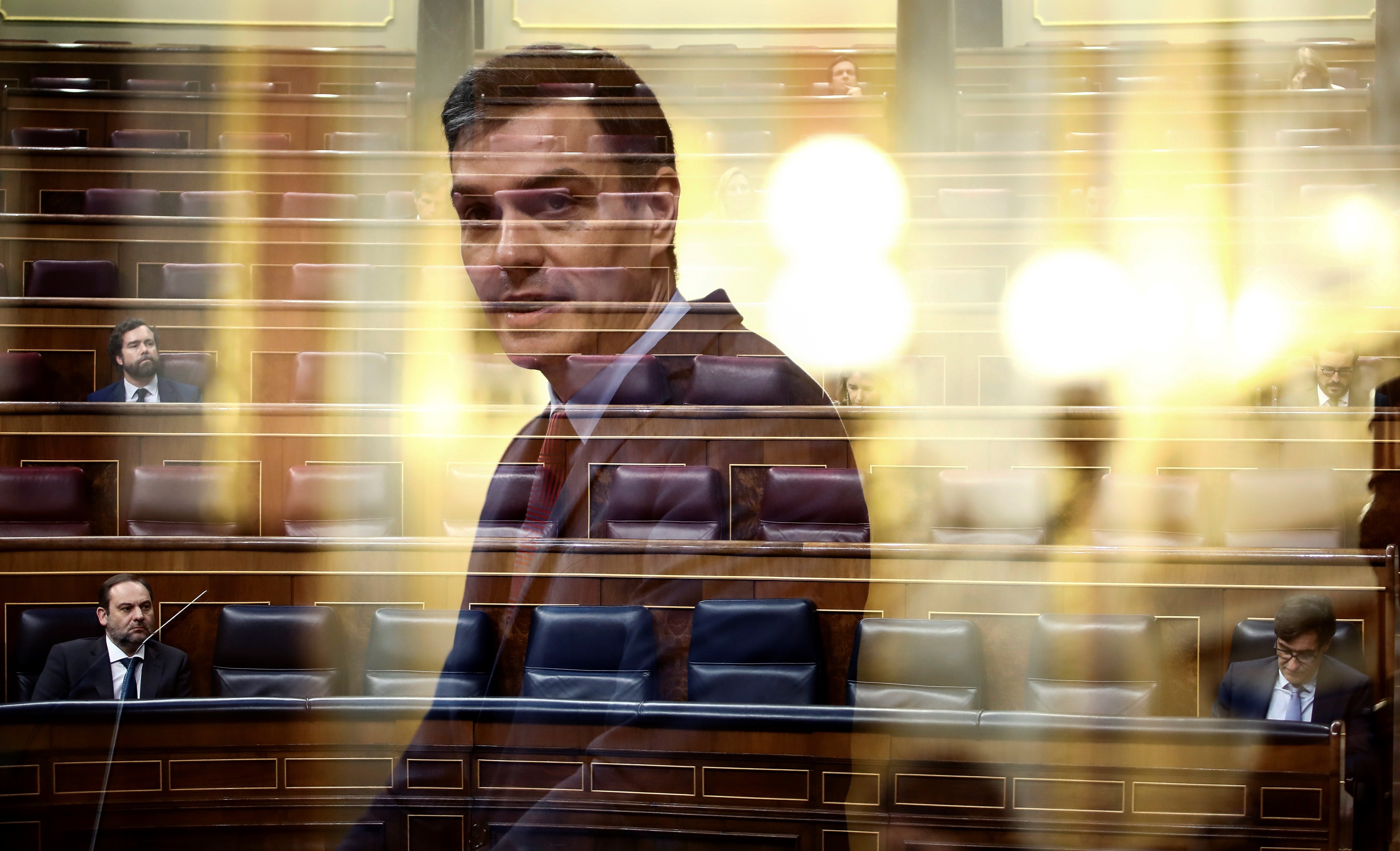Pedro Sánchez walked out of Spain's Congress of Deputies on Thursday evening with one of his goals achieved. Although with less support than two weeks ago, the Spanish lower house accepted his request for a second extension of the state of alarm declared in response to the coronavirus emergency until April 26th - and it won't be the last one. On the other hand, the Spanish Socialist (PSOE) prime minister failed with his other objective: to gather a consensus on the "new Moncloa pacts" which the government has been busily promoting in recent days. The right-wing Ciudadanos (Cs) party, under new leadership, was practically alone in agreeing to attend a meeting next week to move forward on this path.
If the extension to the Covid-19 emergency provisions was supported by 321 votes two weeks ago, now it won 270 votes. And this time, votes against were also registered: 54 in total, with 52 of them from the far-right Vox and two from the far-left CUP. The Catalan independence parties ERC and JxCat, along with the pro-independence Basque party EH Bildu, abstained - 25 votes in all. The sí was left in the hands of the PSOE, Unidas Podemos, Popular Party, Cs, the Basques PNV and Galicians BNG, as well as other regionalist members. Although they voted in favour, Pablo Casado (PP) and Edmundo Bal (Cs) did not hold back their criticisms of the Spanish government's coronavirus crisis management.
In his speech, Pedro Sánchez warned that the return to the "new normality" will be slow and gradual, in order not to undo what has been achieved. But he emphasized that he is already working on a transition plan. A "multidisciplinary" team is assembling the plan, which will propose public health and technological measures for a "stepped" return. This will be adapted to the evolution of the coronavirus epidemic. Each week, the "markers" of the health crisis will be reviewed. "Every weekly breakthrough which the markers show will open up new spaces and cause restrictions to be lifted," said the PM. Everything will be done with "prudence".
Not only was he reprimanded by the right wing parties but also by his potential partners. In particular for the decision to allow non-essential sectors to return to work next Monday, with the risks that this involves. This message reached him from the Catalan parties ERC, JxCat and the CUP and even from left-wing Más País. The Spanish prime minister responded that there were other factors at stake, such as the socioeconomic consequences, and guaranteed that this return to work would be carried out safely and applying health protocols.
Sánchez again took for granted, as he did in his speech last Saturday, that in two weeks he will have to return to the Congress of Deputies to request a new extension of the state of alarm, beyond April 26th. Of course, the idea is that the lockdown will be gradually relaxed if the positive evolution of the statistics is maintained.
The Moncloa pacts, a fiasco
Pedro Sánchez formally invited all the parliamentary parties to a first meeting next week for what he has dubbed the "new Moncloa pacts". He extended the invitation to all parties that want to join, but at the moment that is not many. "We are all called to these pacts," said the Spanish Socialist leader, affirming that the "agents in society and the regional presidents will join this agreement." But the proposal went down like a lead balloon. Neither the Socialists' partners, nor the large parties of the right expressed any interest in the goods that Sánchez was hawking. Scarcely the only positive response was from the ten Ciudadanos MPs, consummating the change of direction under recently confirmed leader Inés Arrimadas.
Pablo Casado labeled Sánchez's offer a "smokescreen". The PP leader accused the prime minister of wanting to appropriate Spain's historically-important 1977 Moncloa pacts in order to "cover up his present failures". The right-wing leader joked that someone who was "unable to negotiate a decree would have difficulties in rewriting the Spanish transition". Meanwhile, Santiago Abascal, the leader of the extremist Vox party demanded the PM's resignation directly. "Pay the wages you owe, and leave," he scolded.
Independence parties, not interested
The same suspicions were expressed, for different reasons, by the parties who have given the government support up until now in the moments when it mattered, beginning with the pro-independence parties. ERC spokesman Gabriel Rufián found the proposal absurd: "The solution cannot be to repeat an error." The ERC member warned Sánchez that "there will be no valid pact" without a prior pact in the European Union and also without agreement with the Catalan and Basque governments. For her part, JxCat's Laura Borràs, appearing by video conference, said she was open to participating in a transversal meeting to address the coronavirus crisis but "not to reissue the Moncloa Pacts." The third Catalan pro-independence voice, Maria Vehí of the CUP, warned that the 1977 pacts involved “reductions in wages, peace without justice or memory, consensus without labour rights and an open door to neoliberalism.”
But the pro-independence parties were critical not only of the Moncloa pacts plan, but also the decision to pull back from Spain's full coronavirus lockdown of the last two weeks. All three Catalan parties hammered the same point on the risks of sending non-essential sectors back to work. A warning that was shared by other potential partners of Sánchez, such as Íñigo Errejón of Más País.
Empty chamber
The PP had threatened to break the rules of lockdown by attending the parliamentary session with half of its members being physically present: 45 out of 89 deputies. In the end, it did not do so, once again limiting its presence to a maximum of 10%. In total, 307 out of the 350 MPs requested a telematic vote, a figure identical to that of two weeks ago. Among them, 77 of the 89 PP members.

